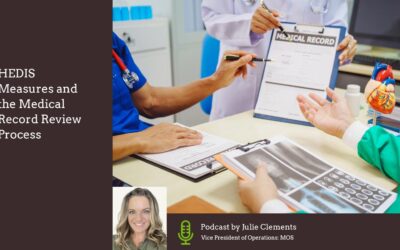Managed Outsource Solutions (MOS) has years of experience providing medical record review services for attorneys, medical legal consultants, and independent medical examiners. Our record review process is designed to meet the unique requirements of each client.
In today’s podcast, Jessica Schwartz, one of our Solutions Managers, discusses: “Can you get workers’ compensation and disability benefits at the same time?”
Podcast Highlights
00:51 Key Differences Between Workers’ Compensation And Social Security Disability Benefits
02:53 Can An Injured Worker Get Both these Benefits at the same time?
04:10 Medical Records Can Help Avoid Claim Denials
05:05 Outsource Medical Records Review to Establish Claims
Read Transcript
If the plaintiff is qualified for both workers’ compensation and disability benefits, he/she is eligible to receive the benefits at the same time. Workers who were injured at the workplace are entitled to receive workers’ compensation which ensures that there is supplemental income when they are disabled while they are waiting for SSD benefits. In such circumstances, a medical record review is integral for attorneys to prove the injury suffered by the plaintiff. In this blog, we will look at the nuances of workers’ compensation and social security disability benefits, as well as the importance of medical records for receiving benefits.
00:51 Key Differences Between Workers’ Compensation And Social Security Disability Benefits
Monetary payments and support can be availed by injured or ill workers from both workers’ compensation and social security disability benefits programs. The benefits received depend upon the occupation and state of the worker. In both cases, a portion of the wages of the worker is covered until the worker can resume work.
Some key differences worth mentioning are:
- The payment for workers’ compensation is facilitated through the insurance policy of the employer. On the other hand, disability benefits are paid through an employee’s health insurance or Social Security Disability Insurance (SSDI) given by federal government.
- The employee is liable for the injuries suffered by the worker and it is covered by the workers’ compensation. Disability benefits also cover the injuries suffered by the plaintiff but it is not necessarily work-related.
- The benefits received by a person pertaining to workers’ compensation last longer than the disability benefits received from Social Security.
- Tax is exempted from workers’ compensation benefits. However, disability benefits are taxable.
- The payments from workers’ compensation continue at a partial rate even after returning to work. There will be no extension of Social Security Disability Insurance benefits when the plaintiff returns to work.
- The health coverage in workers’ compensation is holistic as all the necessary medical expenses that are related to occupational injury or illness are met, without deducting it or limiting it. There are some limitations in the health expenses given under Social Security Disability Insurance which depends upon the laws and regulations of individual states.
- The plaintiff can receive the benefits of workers’ compensation immediately after the illness or injury. In getting SSDI benefits, the applicants have to endure a long application approval process.
02:53 Can An Injured Worker Get Both these Benefits at the same time?
The short answer to this is, yes. An injured worker is eligible to collect benefits from both programs. Being a beneficiary of workers’ compensation doesn’t bar one from getting qualified for SSDI benefits. Even if the person has stopped getting workers’ compensation benefits, the medical expenses will be covered in SSDI, if he/she has the required work credits and disability that incapacitates him/her from doing work.
When the claimant is receiving the benefits from workers’ compensation, an application for SSDI benefits can be initiated. Three to five months may be required to get approval for the SSDI benefits. Below given are some of the steps involved in the application process for getting workers’ compensation and disability benefits:
- The injury has to be reported to the employer
- Complete the application forms pertaining to the benefit programs
- The filled forms have to be forwarded to the employer and the insurance company
- The plaintiff has to get the necessary medical treatments
- A medical record review for attorneys is conducted to analyze the degree of disability and the severity of the injury.
04:10 Medical Records Can Help Avoid Claim Denials
Medical records are integral to winning both workers’ compensation and SSDI benefits. The medical documentation of the encounters can help attorneys analyze the health conditions of the claimant. Specifically, to establish the disability claims, attorneys have to ascertain that the medical condition of the plaintiff is not allowing him/her to do work. It involves evaluating the diagnostic test results, clinical observations, and ER records. This serves as compelling evidence to substantiate the arguments raised by the attorneys.
The timeline of the medical events in the medical records can give an idea about the progress in the health condition of the plaintiff. A deteriorating health condition justifies the grounds on which disability benefits are sought.
05:05 Outsource Medical Records Review to Establish Claims
The efficiency and accuracy in litigating medico-legal cases can be enhanced with proper medical record review organization. Logical compilation of relevant medical information is key to a successful outcome in claiming benefits. The service-oriented approach of a medical records review company ensures that there are no claim denials.
Thank you for listening and have a good day!



